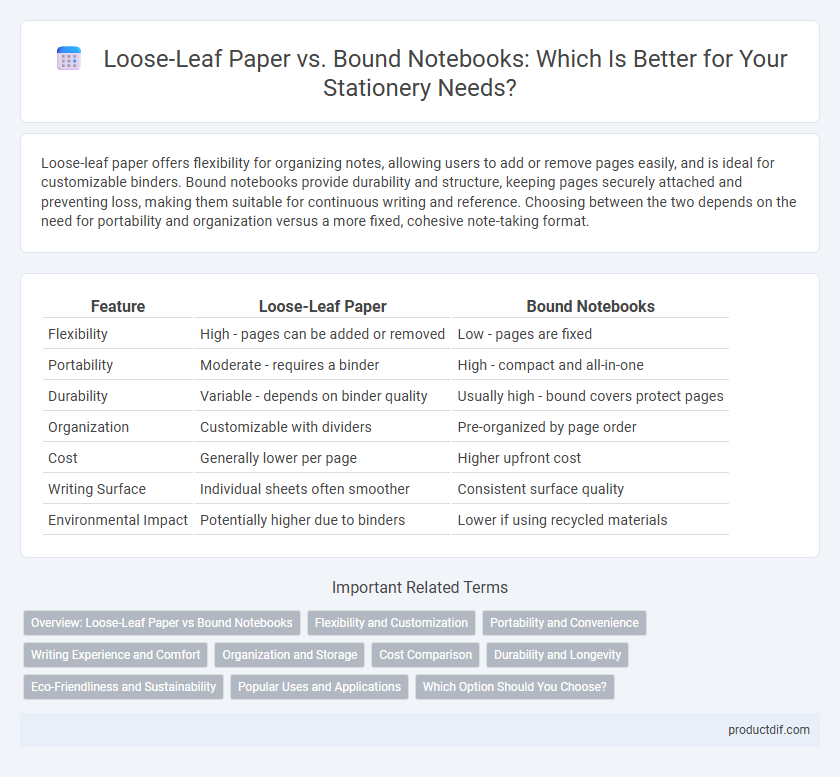Loose-leaf paper offers flexibility for organizing notes, allowing users to add or remove pages easily, and is ideal for customizable binders. Bound notebooks provide durability and structure, keeping pages securely attached and preventing loss, making them suitable for continuous writing and reference. Choosing between the two depends on the need for portability and organization versus a more fixed, cohesive note-taking format.
Table of Comparison
| Feature | Loose-Leaf Paper | Bound Notebooks |
|---|---|---|
| Flexibility | High - pages can be added or removed | Low - pages are fixed |
| Portability | Moderate - requires a binder | High - compact and all-in-one |
| Durability | Variable - depends on binder quality | Usually high - bound covers protect pages |
| Organization | Customizable with dividers | Pre-organized by page order |
| Cost | Generally lower per page | Higher upfront cost |
| Writing Surface | Individual sheets often smoother | Consistent surface quality |
| Environmental Impact | Potentially higher due to binders | Lower if using recycled materials |
Overview: Loose-Leaf Paper vs Bound Notebooks
Loose-leaf paper allows customizable organization with pages that can be added, removed, or rearranged, making it ideal for subjects requiring flexibility. Bound notebooks provide a durable, cohesive structure with pages securely attached, ensuring portability and preventing page loss. Choosing between loose-leaf and bound notebooks depends on the need for adaptability versus permanence in note-taking and organization.
Flexibility and Customization
Loose-leaf paper offers superior flexibility and customization by allowing users to add, remove, or rearrange pages easily, adapting to evolving notes or subjects. Bound notebooks provide a structured format with permanent page order, which can limit reorganization but ensures all notes stay together securely. Choosing between them depends on whether the priority is dynamic content management or consistent, unified documentation.
Portability and Convenience
Loose-leaf paper offers superior portability due to its lightweight nature and ability to be selectively carried or easily rearranged in binders, making it ideal for on-the-go use. Bound notebooks provide convenience by keeping all pages securely together in a compact format, reducing the risk of lost sheets and simplifying note organization. Choosing between the two depends on whether flexibility in page management or streamlined, all-in-one storage is prioritized for daily tasks.
Writing Experience and Comfort
Loose-leaf paper offers customizable writing space, allowing users to organize and rearrange pages easily, which enhances flexibility during note-taking. Bound notebooks provide a stable, cohesive surface that prevents pages from shifting, promoting consistent handwriting comfort and reducing distractions. Both options cater to different preferences, with loose-leaf sheets maximizing adaptability and bound notebooks ensuring a reliable, ergonomic writing experience.
Organization and Storage
Loose-leaf paper allows for flexible organization by enabling users to add, remove, or rearrange pages easily within binders, promoting customized categorization. Bound notebooks offer a compact and durable storage solution, keeping pages securely together to prevent loss and maintain chronological order. Choosing between the two depends on the need for adaptability versus permanence in document management.
Cost Comparison
Loose-leaf paper offers cost efficiency as individual sheets can be purchased and replaced without buying an entire notebook, making it ideal for budget-conscious users. Bound notebooks often have a higher upfront cost but provide durability and organization, which can reduce the need for frequent replacements over time. Overall, loose-leaf paper delivers lower initial expenses, while bound notebooks may offer better long-term value depending on usage patterns.
Durability and Longevity
Loose-leaf paper offers flexibility but is prone to damage and loss without a protective cover, reducing its durability and longevity. Bound notebooks feature a sturdy spine and cover that protect pages from wear and tear, ensuring the content remains intact over extended periods. For long-term use and archival purposes, bound notebooks provide superior durability compared to loose-leaf paper.
Eco-Friendliness and Sustainability
Loose-leaf paper offers increased eco-friendliness due to its modular design, allowing users to replace only used or damaged pages instead of discarding an entire notebook. Bound notebooks often contain glued bindings that complicate recycling and typically result in more waste once filled. Choosing loose-leaf paper made from recycled or sustainably sourced materials significantly enhances sustainability by reducing paper consumption and promoting longer product life cycles.
Popular Uses and Applications
Loose-leaf paper is preferred for customizable note-taking, organizing classwork, and easy document insertion in binders, making it ideal for students and professionals requiring flexibility. Bound notebooks excel in maintaining a cohesive, durable record of meetings, journals, or project notes, favored in office settings and personal use for consistent documentation. Both options cater to distinct preferences: loose-leaf paper supports modular organization, while bound notebooks ensure permanence and ease of transport.
Which Option Should You Choose?
Choosing between loose-leaf paper and bound notebooks depends on your organization needs and portability preferences. Loose-leaf paper offers flexibility by allowing easy addition or removal of pages, ideal for subjects requiring frequent updates or customizable sections. Bound notebooks provide durability and convenience with pre-assembled pages, making them perfect for uninterrupted note-taking and maintaining a consistent record.
Loose-leaf paper vs Bound notebooks Infographic

 productdif.com
productdif.com